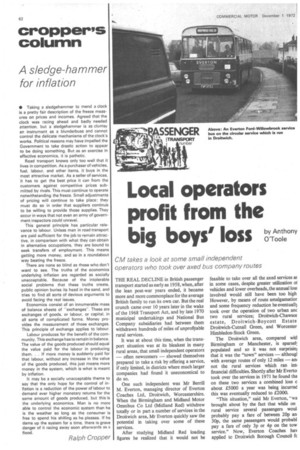cropper's column
Page 64

If you've noticed an error in this article please click here to report it so we can fix it.
A sledge-hammer for in
• Taking a sledgehammer to mend a clock is a pretty fair description of the freeze measures on prices and incomes. Agreed that the clock was racing ahead and badly needed attention, but a sledgehammer is as clumsy an instrument as a blunderbuss and cannot control the delicate mechanisms of the clock's works. Political reasons may have impelled the Government to take drastic action to appear to be doing something. But as an exercise in effective economics, it is pathetic.
Road transport knows only too well that it lives in competition. As a purchaser of vehicles, fuel, labour, and other items, it buys in the most attractive market. As a seller of services, it has to get the best price it can from the customers against competitive prices submitted by rivals. This must continue to operate notwithstanding the freeze. Small adjustments of pricing will continue to take place: they must do so in order that suppliers continde to be willing to provide those supplies. They occur in ways that not even an army of government inspectors could unravel.
This general principle has particular relevance to labour. Unless men in road transport are paid sufficient for the job to remain attractive, in comparison with what they can obtain in alternative occupations, they are bound to seek transfers of employment. This means getting more money, and so in a roundabout way beating the freeze.
There are none so blind as those who don't want to see. The truths of the economics underlying inflation are regarded as socially unacceptable. Because of the intolerable social problems that these truths create, public opinion buries its head in the sand, and tries to find all sorts of devious arguments to avoid facing the real issues.
Economics consist of an innumerable mass of balance sheets of "exchanges". These are exchanges of goods, or labour, or capital, in all sorts of complicated forms. Money provides the measurement of those exchanges. This principle of exchange applies to labour.
Labour produces for the benefit of the community. This exchange has to remain in balance. The value of the goods produced should equal the value paid for the labour in producing them. . . If more money is suddenly paid for that labour, without any increase in the value of the goods produced, this just means more money in the system, which is what is meant by inflation.
It may be a socially unacceptable theme to say that the only hope for the control of inflation is a reduction of the power of labour to demand ever higher monetary returns for the same amount of goods produced, but this is the underlying economics. Man is no more able to control the economic system than he is the weather so long as the consumer is free to spend his shilling as he pleases. If he dams up the system for a time, there is grave danger of it racing away soon afterwards as a flood.
Ralph Cropper
































































































































